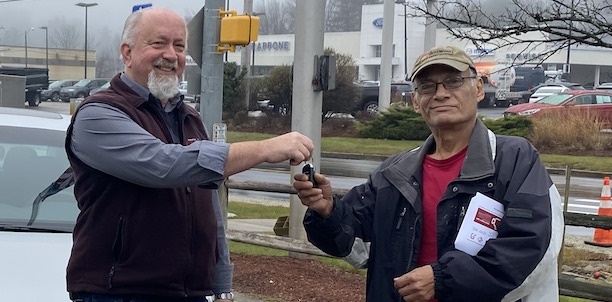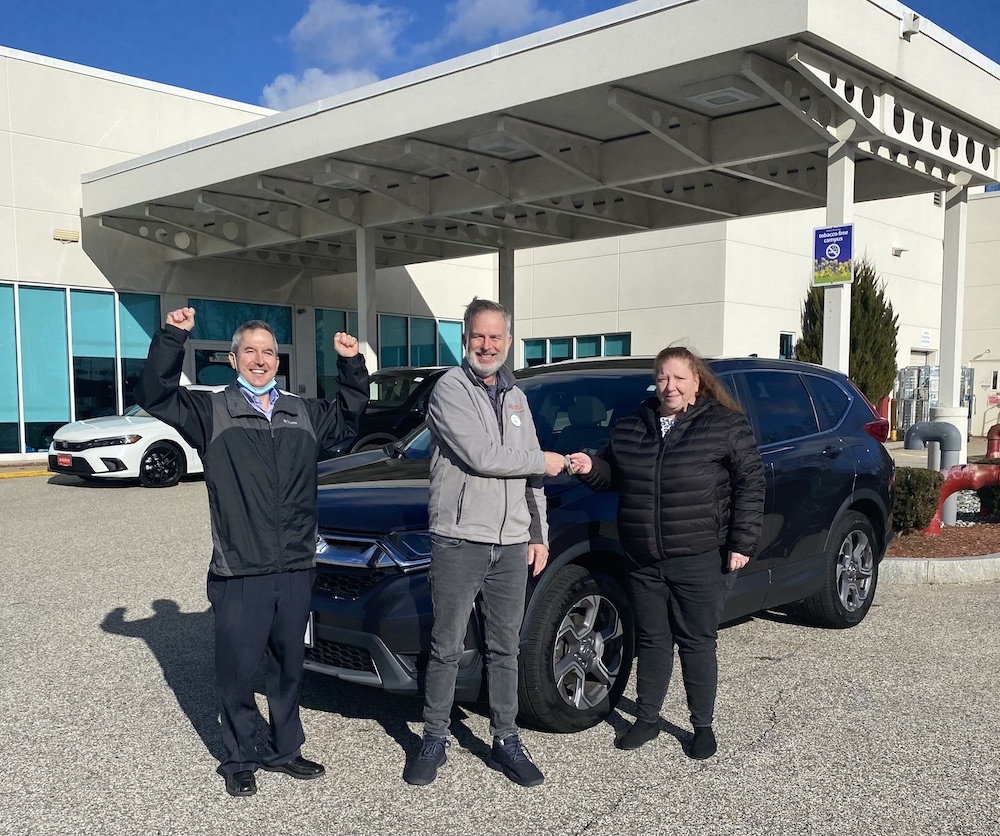Jose Martinez's 30 minute commute to work includes a long hill – one that he typically travelled by foot or on his bike through all types of weather. "Sometimes it would be too hot," he says. "Sometimes it would be cold." Occasionally, he became light-headed.

LRCD got the idea for the program after analyzing a survey put out to their 366 households. "We were trying to see what people needed most," says Caitlin Meaney, resource development director. "Reliable transportation" topped the list. In rural New Hampshire, as in many rural places, "there is just no such thing as public transportation," Meaney shares. And cab services are too pricey for low- to moderate-income residents.
"Lack of reliable and affordable transportation can be a large roadblock for a family's financial stability and overall well-being," says Meaney. "Take the Wheel NH believes New Hampshire families should not have to choose between keeping a roof over their heads, food on the table, or car repairs. When more low-income community members have quality affordable vehicles, it enables them to meet their family's basic needs and pursue opportunities that would otherwise be unattainable due to a lack of reliable transportation."
Qualifying residents sign up for the program through LRCD, filling out paperwork and
 Jenn Reardon receives the keys to her new vehicle.
taking introductory video courses on financial basics. "The videos I watched were so informational," shares Jenn Reardon. Reardon graduated from the program a month ago, trading in her unreliable gas guzzler, which she was paying off via a high-interest loan, for a 2018 Honda CRV, with a new, manageable loan. "It was a real eye-opener. Now I'm paying attention to what I'm spending each month and I'm able to save a little bit more."
Jenn Reardon receives the keys to her new vehicle.
taking introductory video courses on financial basics. "The videos I watched were so informational," shares Jenn Reardon. Reardon graduated from the program a month ago, trading in her unreliable gas guzzler, which she was paying off via a high-interest loan, for a 2018 Honda CRV, with a new, manageable loan. "It was a real eye-opener. Now I'm paying attention to what I'm spending each month and I'm able to save a little bit more."

Once participants complete the financial preparedness courses – which help ensure they are prepared to manage the additional expense of a car loan – program participants meet with a financial counselor. For this part of the program, Lakes Region has partnered with HOMEteam. Counselors help residents create a budget and work on a plan for paying down debt and raising credit scores.
The program is meant to help residents become "educated car buyers," Meaney says. When clients complete the program, they qualify for a low-interest loan from Franklin Savings Bank, another partner, and work with Grappone Automotive Group, a local car dealer who understands the program and the budget.
"So much of what can keep people down is tied together – if they don't have proper housing, if they don't have childcare, and if they don't have a car to get them where they need to go," says Amanda Osmer, director of corporate potential for Grappone. She's among the fourth generation to work at the family dealership, which has a community focus.
Sarah Kackar, director of Rural Initiatives for NeighborWorks America, says safe and reliable transportation is critical to living in rural and remote communities. "Large geographic distances between people's homes and services like education, employment, food, and medical care, can create hardships in accessing the necessities of everyday life," she says. "Whether through public transit, nonprofit services or private means, transportation is a critical element of infrastructure which often becomes an equity issue, as in urban and suburban communities alike, when economic barriers prevent some groups from engaging in basic services."
Take the Wheel NH has three recent graduates, with another 10 working on one-on-one counseling and 40 enrolled in for the online courses. Meaney says her organization has learned a number of lessons since they started Take the Wheel as a small, pilot program for five clients in 2020. The biggest lesson, she says, is that, especially as supply chain issues increase car prices, the program is out of reach for the lowest income residents.
Last year, the automotive industry saw a shortfall of more than 7 million cars, part of a semiconductor shortage. Osmer, whose own car lots have 10% the inventory they had two years ago, predicts it will be at least another year and a half before levels improve. As Take the Wheel adjusts and grows, Meaney hopes the organization will eventually be able to generate funds to help the state's lowest-income residents.
Those who have been able to participate are seeing a lifestyle difference. For Martinez, the hill no longer looms as large. Reardon, who uses the car to get to work at a local nonprofit, says she's glad to be done with the extensive engine repairs and borrowing cars from friends or family to get her children where they need to go. "Working with the whole team has been a great experience," she says.

